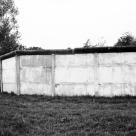Excerpt:
When I was a seven-year-old child, my individual memory was greatly influenced by collective memory. The place where I grew up was surrounded by beautiful forests. Back then, it was common for my family to go into the woods for walks and hikes. After the summer months, when it is still a little warm but the rain starts falling harder, the whole family, equipped with knives and baskets, would walk deep into the woods to collect mushrooms. The person who found the biggest amount of porcini, a fairly rare species, would be celebrated for the rest of the day. All wet, hungry and tired but also very happy we would walk back home and cook the mushrooms for dinner.
In 1986, the Chernobyl disaster had a deep impact on the above-mentioned events and on my individual memory. I remember my mum turning up the radio, panicky. A monotonous voice telling us to stay inside and to keep the windows closed. Keep your children inside the house, don’t let them play outside. At first, it seemed exciting and adventurous. It was raining and I wasn’t interested in playing outside anyway. I stared out of the closed window, trying to see the dangerous particles the news anchor was talking about, but saw nothing. A few weeks later, however, this abstract event started to impact my life greatly. During one of our regular strolls in the woods, I learned that my beloved wild berries that were just beginning to grow along the way might be contaminated. I was not allowed to pick and eat them. After the summer, my grandmother told me that we would not be going to collect mushrooms, and she couldn’t tell me how long this would be the case […]
Please download my paper as a PDF file, click the link:
Blurred-Borders-I.M.Schmidt-2017
